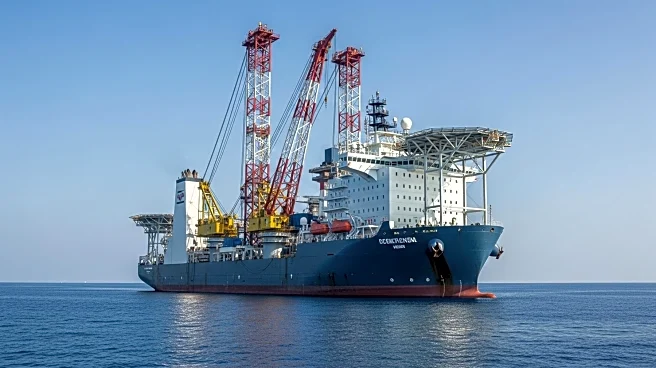What is the story about?
What's Happening?
Belgian marine contractor Jan De Nul has ordered a new rock installation vessel named George W. Goethals, designed to enhance the protection of offshore energy and subsea data infrastructure. The vessel, with a carrying capacity of 37,000 tonnes, will feature ultra-low emission technology and engines capable of running on biofuel and green methanol. It will be equipped with a flexible vertical fall pipe and an inclined fall pipe system, allowing it to install extra-large rocks at depths of up to 400 meters. The vessel will operate primarily in the North Sea and Southeast Asia, joining Jan De Nul's existing fleet and supporting interconnector projects linking energy grids globally.
Why It's Important?
The introduction of the George W. Goethals vessel represents a significant investment in protecting critical subsea infrastructure, which is vital for global energy production and data transmission. Thousands of kilometers of subsea cables are vulnerable to damage and potential sabotage, making their protection crucial for maintaining reliable energy systems worldwide. The vessel's advanced technology and capacity to operate at significant depths will enhance the security and efficiency of these infrastructures, supporting the growing demand for renewable energy and international data traffic.
What's Next?
Jan De Nul's new vessel is expected to be operational soon, contributing to the company's efforts to secure subsea infrastructure. The vessel's deployment will likely lead to increased collaboration with energy companies and governments focused on safeguarding critical infrastructure. As global energy demands rise, the vessel's capabilities may also support the expansion of renewable energy projects, particularly offshore wind farms, further integrating sustainable practices into the energy sector.
Beyond the Headlines
The development of such advanced vessels highlights the growing importance of environmental considerations in marine operations. By utilizing biofuel and green methanol, Jan De Nul is setting a precedent for reducing emissions in the maritime industry. This move aligns with broader global efforts to combat climate change and promote sustainable energy solutions, potentially influencing other companies to adopt similar technologies.














